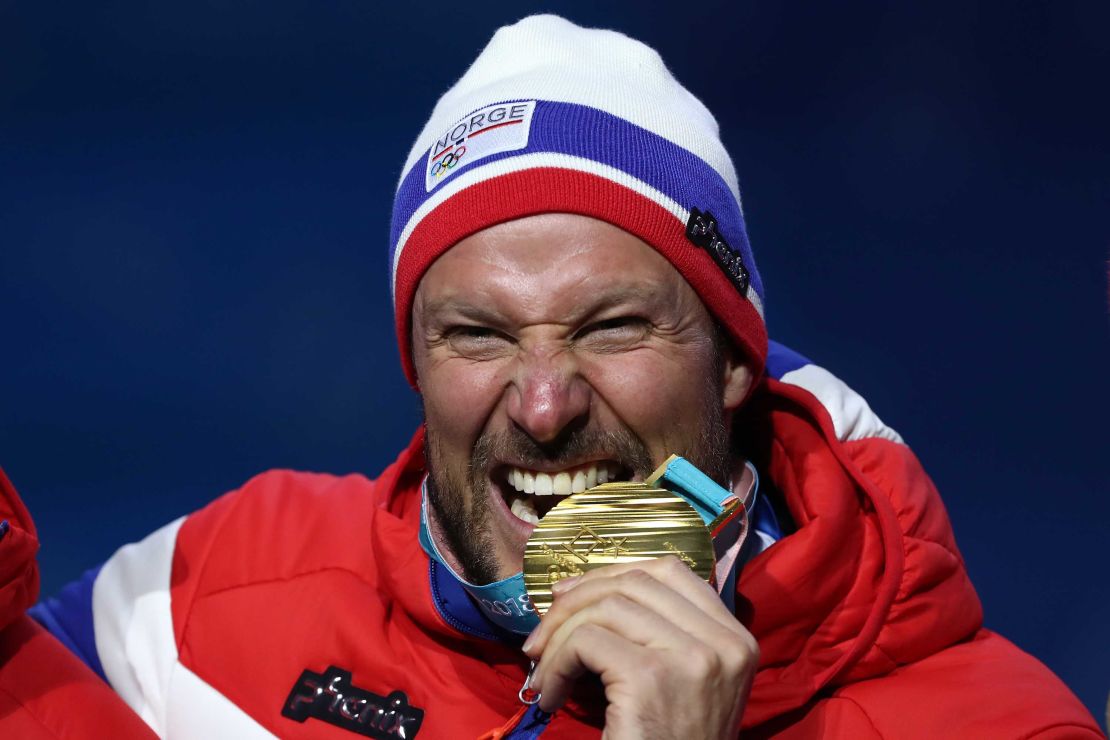Story highlights
Aksel Lund Svindal wins men's downhill gold
He becomes Norway's first downhill champion
He’s one of Norway’s best-loved and most successful winter athletes and now Aksel Lund Svindal has made history by becoming the oldest skier to win Olympic gold and his country’s first in the speed discipline.
The 35-year-old beat close friend and countryman Kjetil Jansrud into silver with Swiss world champion Beat Feuz in bronze in what is often considered the blue riband event of the Winter Olympics.
Last 10 men's downhill champions
Svindal has been one of the dominant skiers of his generation, with multiple world titles and World Cup crowns as well as Olympic super-G gold, downhill silver and giant slalom bronze in Vancouver in 2010, but Olympic downhill gold had always eluded him.
But on a perfect day after a week of high wind and delays at the Jeongseon Alpine Centre, Svindal defied history to edge Sochi super-G champion Jansrud by 0.12 seconds with Feuz 0.18 secs back.
READ: Winter Olympics day 6: As it happened
READ: Olympic downhill champions tell tales of gold
Svindal is three months older than Austria’s Mario Matt was when he won the slalom at the age of 34 in Sochi. American Bode Miller became skiing’s oldest male medalist when he won bronze at Sochi at the age of 36.
“When you cross the finish line and you see that you’ve had a good race and you’re in the medals or even for the gold, you don’t think too much about the history books,” Svindal told reporters afterwards.
“It’s emotional, and being in the Olympics and competing for gold and being able to get it, for me at least those feelings are much stronger than any history ever written.”
The best photos of alpine skiing at the Winter Olympics
Managing injury
Svindal began his Olympic career in Turin in 2006 and has since won five world titles, including the downhill in 2007 and 2013, and two World Cup overall crowns alongside 35 World Cup wins.
However, downhill skiing legend Franz Klammer told CNN in the build-up to the Games a speed skier’s greatness was judged on whether they won Olympic gold. The Austrian great said he would have judged himself a “failure” without it.
But the margins are miniscule.
In Vancouver, Svindal missed out on downhill gold by 0.07 seconds behind the winner, Didier Défago of Switzerland, and was only 0.02 secs ahead of Miller in bronze.
READ: Mikaela Shiffrin begins gold quest with giant slalom win
Four years later he could only finish fourth in downhill after carrying Norway’s flag at the opening ceremony, and since then has endured a string of serious injuries which have forced him to miss large chunks of the World Cup circuit.
He suffered a season-ending crash at Kitzbuehel in 2016 and missed the following season after knee surgery.
This season he has scored three World Cup wins so far, but still has to limit his training time to manage his knee.
READ: Inside the mind of a downhill racer
READ: Best photos from day 6 in Pyeongchang

‘Last Olympics’
Svindal admitted in the afterglow of winning gold that his illustrious career was drawing to close.
“I guess this is the beginning of the end somehow, definitely my last Olympics. Nothing is 100% sure but that’s very, very close to being 100% sure,” he added.
The Sochi downhill gold medalist, Matthias Mayer of Austria, finished ninth to continue the streak that no one has won back-to-back men’s downhill titles in the 70-year history of the event at the Winter Games.
The men’s speed skiers will contest the rearranged super-G at the Jeongseon Alpine Centre Friday.






















